2022-12-21
来自印度的毕业生Sufia Imam是暨南大学的国际留学生,“按计划行事”和“未雨绸缪”的生活方式是她顺利获得医学学位的秘诀。她以乐观的态度面对跨国学习的困难,从未让文化差异和语言障碍成为求学之路上的“拦路虎”。
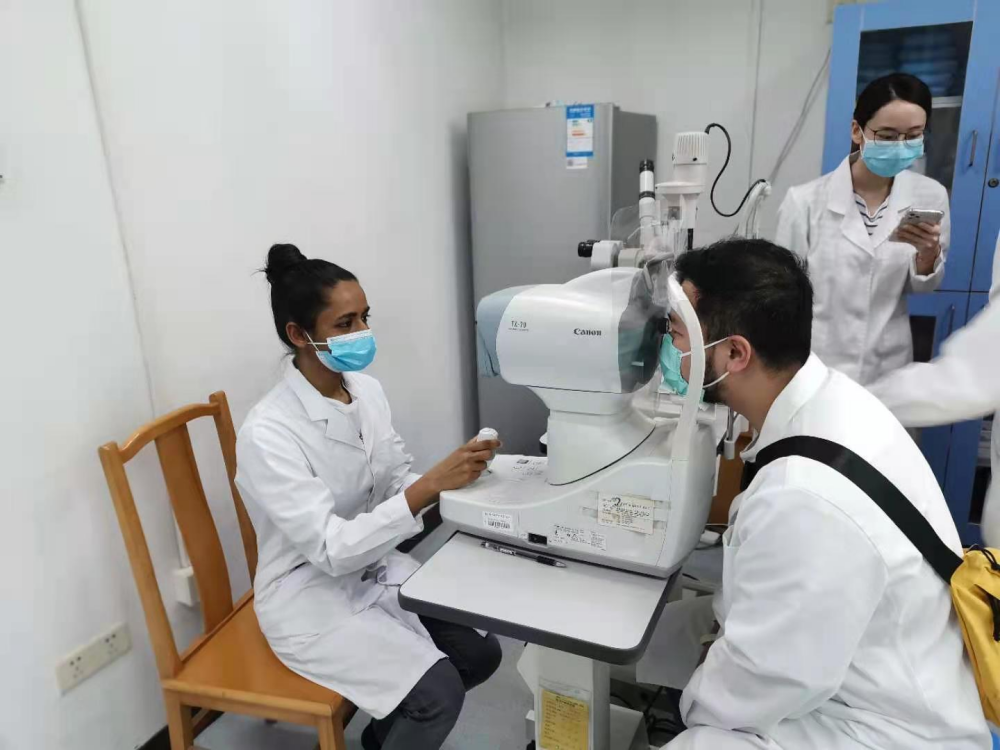 (Sufia在广州华侨医院实习)
(Sufia在广州华侨医院实习)
白衣天使
Sufia的父母一直支持着她的医学梦想,最先建议她到中国学医的是她的母亲。一位家族好友向Sufia的母亲提了这个建议,因为其三个孩子都到了中国的医学院求学。Sufia经过考虑后,便在2016年向暨南大学医学院提交了申请并被成功录取。同年11月,她来到了广州,开始了第一年的“大学冒险”。
进入医学领域是我一直以来的梦想。在童年时期,每次到诊所和医院看医生,我都非常喜欢他们穿白大褂的样子。
像许多医学生一样,Sufia拖着厚重的专业课本,经常辗转于各种各样的医学器械,度过六年的求学时光。相比起在印度的学习经历,早上八点到晚上九点半的课程安排让她把大多数时间都放在课业上。
即便在医院工作期间,她每天也会尽量抽出2到3个小时进行学习;而在假期期间,她甚至可以每天投入多达9个小时。当面临众多的需要学习和记忆的材料时,她发现复习巩固和反复纠错是必不可少的。因此,她在宿舍墙上钉了各种各样的“视觉工具”帮助掌握和稳固知识体系,这让她有了十足的底气。
Sufia说,中国的医学院的学费比印度的私立大学更实惠。除了学费和课程安排的差异之外,每个国家也有自己的医疗法规、准则和惯例。“但只要我们能成为好的医生,这些都不是阻碍。”Sufia如是说。
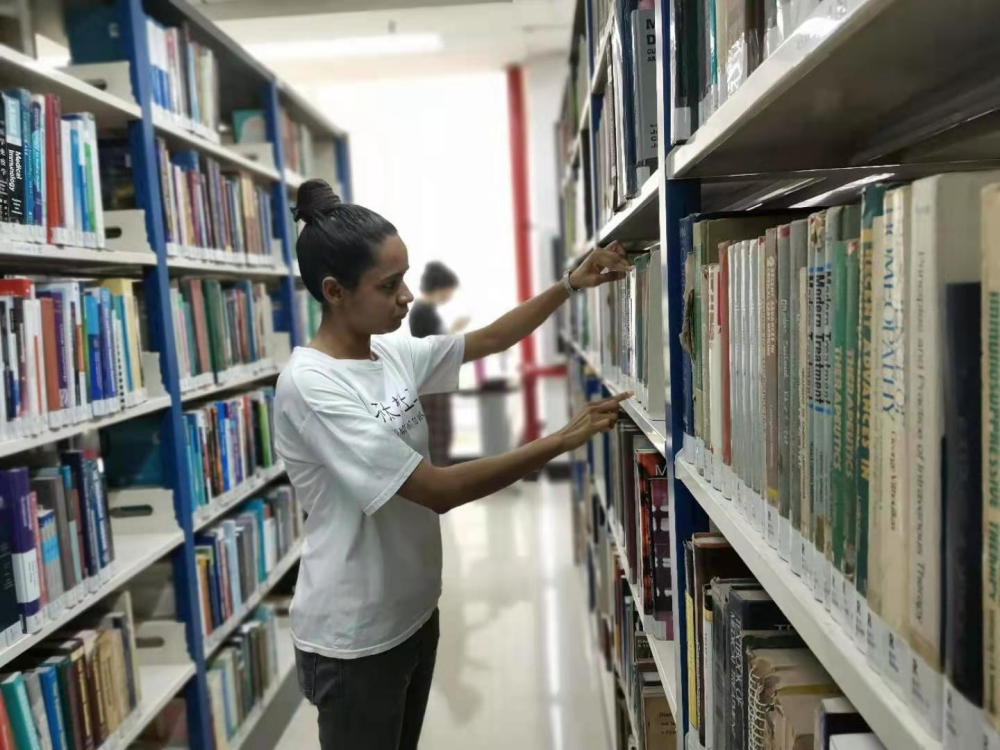 (Sufia经常花很长时间在图书馆阅读)
(Sufia经常花很长时间在图书馆阅读)
医学不分国界
Sufia是暨南大学第一附属医院(又名广州华侨医院)里唯一一位国际医学生,这段经历让她对医疗体系有更深入的看法。
“我起初既担心又紧张。对于医院的每一个人来说,我都是一张陌生的面孔。当我给病人把脉、听诊、换绷带,或者当我走进手术室的时,大家都很惊讶。但尽管如此,他们都面带微笑地跟我打招呼,友好地问我各种问题。总而言之,我的实习经历非常愉快。”
即使存在着语言和习俗上的差异,医学也可以治愈所有人。
让她印象深刻的一次经历发生在上儿科夜班的时候。那天晚上,她的研究生学长突然让她去换上手术服,并告知他们将要做一场紧急剖腹产手术,而且病人已经发烧两三天了。原来,这位病人来自非洲,不知道如何用中文交流,Sufia便成了医生和病人之间的通讯员。
生产结束后,Sufia将婴儿抱进怀里并送到这位母亲面前。Sufia回忆说,那是一次令人深为感动的经历。“我与那对刚为人父母的夫妻进行了情感上的交流。这次经历教会了我,医患沟通应当要让病人感到轻松自在。”
这段实习经历让Sufia的中文口语能力得到了很大的提升。她可以根据患者所述并结合个人所见,输出专业的患者报告。此外,她还参加了如急救、癌症防御等各种项目培训。
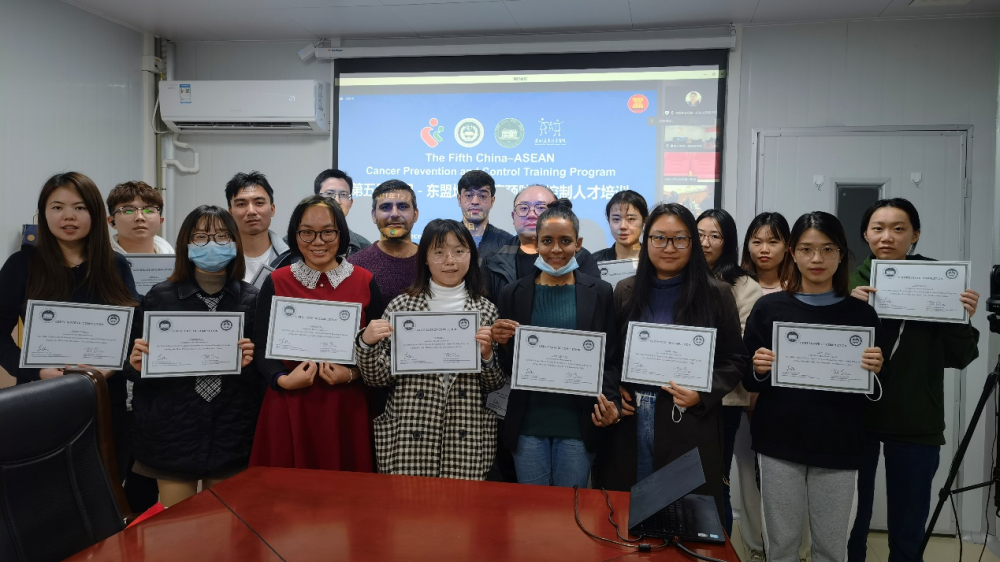 (2021年12月,Sufia参加为期两天的第五届中国-东盟癌症预防与控制人才培训)
(2021年12月,Sufia参加为期两天的第五届中国-东盟癌症预防与控制人才培训)
一个舒适、安全、和平的中国
回顾和总结自身的经历,Sufia认为,不仅目标和努力可以使人成功,机遇环境等其他因素也同样重要。她回忆说:“我非常感激让我进入医学领域并支持我走到今天的一切人和事。”
“留在中国是我做的一个正确的决定。正因如此,我才可以完成我的学业、实习和考试。”尽管Sufia孤身前往中国求学,但她从不感到孤单,因为她身边总是环绕着关心她的老师、同学和工作人员,这尤其体现在疫情期间。她补充道:“我发现中国是一个舒适、安全且和平的地方。”
她还分享了她和学校清真餐厅里叔叔阿姨们的友谊。他们总是互相问候,因为餐厅就在Sufia宿舍的对街。Sufia偏爱清真食品,因此在这六年间,提供心爱美食的这家餐厅于她而言,是一个尤为特别的地方。当她准备回国的时候,叔叔阿姨们都非常不舍,当然,他们也更为她的顺利毕业感到开心。
尽管日程繁忙,但Sufia仍经常参与各类校内外的文化活动或论坛,例如“看中国·外国青年影像计划”和“广州国际学生学习与文化交流项目”。就在回印度的前几周,她还参加了“2022年联合国中文日暨第二届CMG海外影像节”,在来自45个不同的国家的950份参赛视频中,她以中国时尚类提交的汉服作品拿到了第11名的好成绩。
回国三个月后,Sufia非常想念中国价格实惠的网上购物。在印度,她必须为同一款产品支付三倍到四倍多的价钱。有时她会后悔之前没有趁着在广州读书之便,提前买好带回印度。
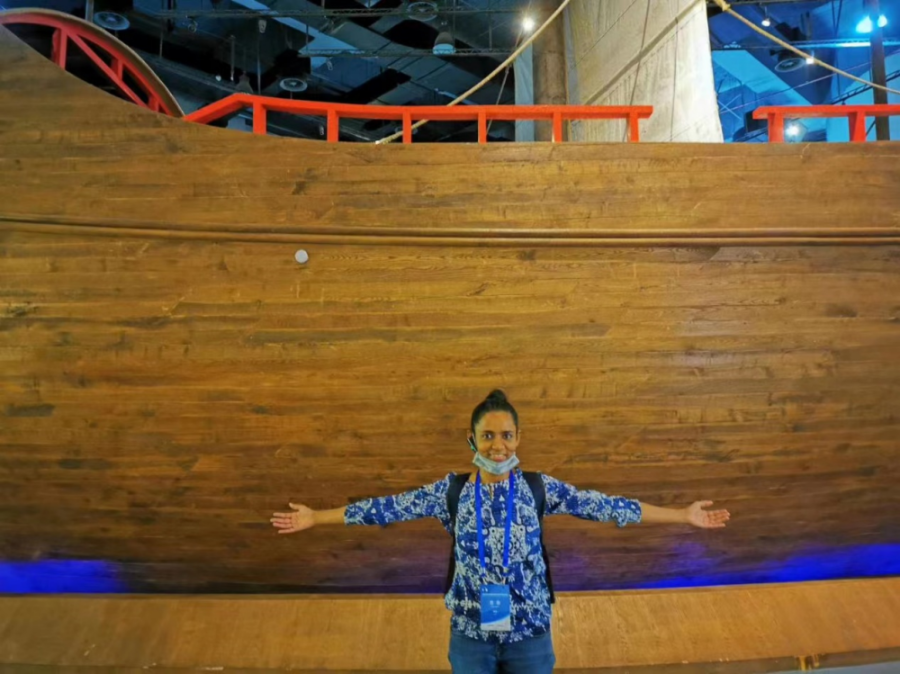 (Sufia参观广东博物馆,进一步了解和学习中国历史和文化)
(Sufia参观广东博物馆,进一步了解和学习中国历史和文化)
作为医学生的收获
Sufia从多为教授身上学会了如何前瞻趋势、扩大眼界和规划未来。在校期间,她认识到了自制力和规划人生的价值,并相信未来可以利用这些来让生活变得更好。例如,早起和按时就餐是简单且健康的生活习惯。她相信,坚持自律这一习惯会随着时间的推移,产生愈加显著的效果。正如谚语所说:“良药苦口利于病。”她认为,要想有所成就,就必须努力工作、自律自控、坚持不懈。
按照Sufia的计划,在不久的将来,她从事精神病学的相关工作。
“我曾见过很多人经历抑郁或者患上其他精神疾病,而且他们中的大部分人缺乏谈论这件事的勇气。当提到精神疾病的时候,病人总是尽可能尝试去隐瞒。这是非常危险的,既不利于病人个人自身的心理健康,也不利于整个社会。”对于人们与日俱增的心理问题,她希望能够尽自己所能帮助他们解决。
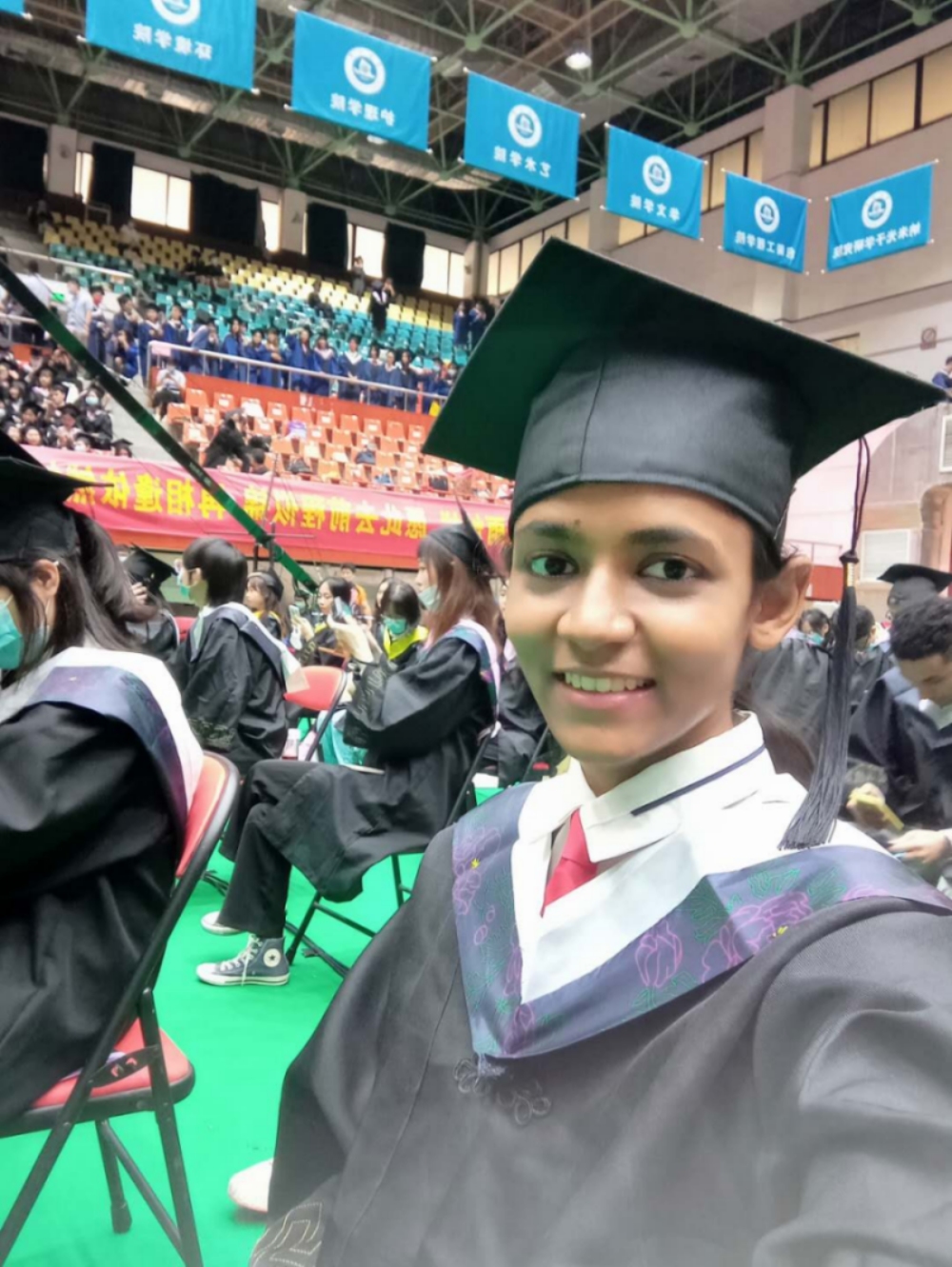 (经过六年的努力,Sufia怀着感恩之心顺利毕业)
(经过六年的努力,Sufia怀着感恩之心顺利毕业)
Fresh off the university: International student Sufia Imam recounts her medical school experience in China
Fresh graduate Sufia Imam from India found herself banking on discipline, preparedness, and a planned lifestyle as recipes for earning her medical degree. She never let cultural differences and language barriers hinder her learning, as they should, especially for the field of medicine. In fact, she embraced them with optimism.
An angel in a white uniform
Sufia's parents have always been supportive of her dreams. Her mother was the one who originally suggested she consider going to China to study medicine. A family friend whose three children have all attended medical school in China gave her the suggestion. Sufia's mother looked into it and discussed it with her. In 2016, Sufia applied to Jinan University (JNU) and was accepted. She set out for Guangzhou in November, excited to begin her first year of college adventure.
Entering into the field of medicine has been a constant dream of my life. In my childhood, I used to see doctors in clinics and hospitals,and I just loved the way they looked in white aprons.
Like many medical students, Sufia spends the better part of six years lugging around thick textbooks and making frequent rounds in various medical facilities. Her classes start at 8:00 a.m. and go until 9:30 p.m., which she thinks is a bit too much when compared to the schedule of classes in India. This leaves her with little spare time.
During the holidays, she can put in as much as nine hours per day studying instead of the two or three she usually manages when she has to do work at the hospital. When faced with a large amount of material to learn and memorize, she finds that review and revision are indispensable. Sufia memorized using a variety of visual aids pinned on her dorm room wall. She acknowledges that when memorization becomes permanent, confidence is gained.
According to Sufia, medical school in China is more affordable than private Indian universities. Apart from differences in tuition and course scheduling, each country also has its own medical regulations, guidelines, and practices. “As long as we become good doctors, these should not bother any of us,” she said.
Medical science knows no nationality
Sufia started her internship in the midst of the COVID-19 pandemic, which gave her a unique perspective on how tense things were within hospitals. Aside from that, she was the only international medical student at the First Affiliated Hospital of Jinan University, also known as the Guangzhou Overseas Chinese Hospital.
“I was initially concerned and nervous. For everyone in the hospital, I was a foreign face. When I went to the patient to check the pulse, listen to the heartbeat, change the wound dressing, or enter the operating room, they were surprised. Nonetheless, they greeted me with a smile. They did have many questions. In a nutshell, my experience was very pleasant.”
Even if there are differences in language and customs, medicine can cure everyone. Just because you do not speak the language of the country where you are, does not mean you cannot [receive the necessary] healthcare.
One of her most memorable experiences occurred during a night shift at the pediatrics department, when her post-graduate senior instructed her to change her clothes and put on scrubs. There would be an emergency caesarean delivery. Due to the patient’s having had a fever for two to three days, the doctors decided a caesarean delivery would be performed. It turned out that the patient was from Africa and had no idea how to express herself in Chinese. Sufia then played the role of a messenger between the doctors and the patient.
Moments after its birth, Sufia took the newborn into her arms and showed it to the mother for the first time. That, Sufia recalled, had been a profoundly touching event. “I was emotional communicating with the couple who had just given birth to their first child. [The experience] taught me that doctor-patient communication should make the latter feel at ease and relaxed."
Sufia's ability to speak Chinese improved during her internship. She was able to generate quality patient reports by taking into account both auditory (what the patient says) and visual (what you see at the hospital) aspects. In addition, she participated in various training programs such as first aid and cancer prevention.
A comfortable, safe, and peaceful China
Based on her experience, Sufia believes that it is not only goals and hard work, but also several factors, including opportunities and the environment, that contribute to a person’s success. “I am grateful that the factors which led me to the field of medicine and where I am now were favorable,” she reflected.
“I made the right decision to stay [in China, because by doing so], I was able to complete my courses, internship, and examination on site.” Even though she was by herself, Sufia never felt lonely because she was surrounded by JNU professors and staff who regularly checked in on her, especially during the pandemic. “I find China a comfortable, safe, and peaceful place to live in,” she added.
She also shared good relationships with the ayi’s and shushu’s at the campus halal canteen. They constantly greeted each other, especially because the canteen was just across the street from Sufia's dorm building. Sufia has a preference for halal dishes and thus, for six years, relied on food from the canteen, making the place particularly special to her. They were filled with emotions as Sufia prepared to return home, yet they were overjoyed that she had graduated.
Despite her busy schedule, she manages to take part in various JNU-sponsored cultural events and discussions, as well as off-campus cultural exchange activities such as the Looking China Film Project and the Learning and Cultural Exchanges Program for International Students in Guangdong. Just a few weeks before she flew back to India, she participated in the 2022 UN Chinese Language Day and the Second CMG Overseas Chinese Language Video Festival. Among the 950 video submissions from 45 countries, her entry on hanfu for the China Chic category came in at number 11.
After being back in her home country for three months, Sufia specifically misses online shopping in China, where prices are affordable. There, she has to pay three or four times as much for the identical items. At times, she regrets not purchasing them while in Guangzhou.
Takeaway from being a medical student
Sufia's professors taught her the skills to anticipate events, gain insights, and plan for the future. She learned the importance of discipline and the value of living a planned lifestyle during her time at the university. This is something she believes she can use to better herself every day for the rest of her life. For example, waking up early and eating early for lunch and dinner are simple yet healthy routines that, if followed with discipline, can produce better results over time. As the saying goes, bitter medicine has a beneficial effect. She believes that in order to achieve something big, one must work hard, toil, and be disciplined and consistent.
In the near future, Sufia plans to pursue psychiatric specialization. She feels the need to help in her own way to address the increasing number of people facing mental health issues.
“I have seen a lot of people being depressed or having psychological or psychiatric disorders and not speaking about it louder and confidently... [W]hen it comes to psychological or psychiatric disorders, the person will try to hide as much as possible. This is dangerous. This is not good for that person’s mental health and society as a whole.”
(瞭新社)
特别声明:本站转载或引用之图文若侵犯了您的合法权益,请与本站联系,本站将及时更正、删除。版权问题及网站合作, 请通过瞭望新时代邮箱联系:lwxsd@liaowanghn.com
 推荐阅读 换一换
推荐阅读 换一换 